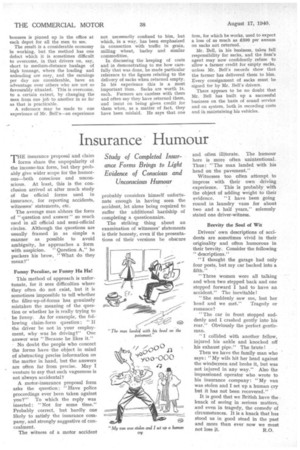Insurance Humour
Page 34

If you've noticed an error in this article please click here to report it so we can fix it.
Study of Completed Insurance Forms Brings to Light Evidence of Conscious and Unconscious Humour
"THE insurance proposal and claim I forms share the unpopularity of the income-tax form, but they probably give wider scope for the humorous—both conscious and unconscious. At least, this is the conclusion arrived at after much study of the official forms used in insurance, for reporting accidents, witnesses' statements, etc.
The average man abhors the form of "question and answer" so much used in all official and semi-official circles. Although the questions are usually framed in as simple a manner as possible to avoid ambiguity, he approaches a form with suspicion. "Question A," he puckers his brow, " What do they mean?"
Funny Peculiar, or Funny Ha Ha!
This method of approach is unfortunate, for it sees difficulties where they often do not exist, but it is sometimes impossible to tell whether the filler-up-of-forms has genuinely mistaken the meaning of the question or whether he is really trying to be funny. As for example, the following claim-form question: "If the driver be not in your employment, why was he driving?" One answer was "Because he likes it."
No doubt the people who concoct the forms have the object in mind of abstracting precise information on the matter in hand, but the answers are often far from precise. May I venture to say that such vagueness is not always accidental?
• A motor-insurance proposal form asks the question: "Have police proceedings ever been taken against you?' To which the reply was inserted : "Not for some time." Probably correct, but hardly one likely to satisfy the insurance company, and strongly suggestive of concealment.
The witness of a motor accident
probably considers himself unfortunate enough in having seen the accident, let alone being required to suffer the additional hardship of completing a questionnaire.
The striking thing about an examination of witnesses' statements is their honesty, even if the presentations of their versions be obscure
and often illiterate. The humour here is more often unintentional. Thus : "The man landed with his head on the pavement."
Witnesses too often attempt to impress with their own driving experience. This is probably with the object of adding weight to their evidence. "I have been going round in laundry vans for about two and a half years," solemnly stated one driver-witness.
Brevity the Soul of Wit Drivers' own descriptions of accidents are sometimes vivid in their originality and often humorous in their brevity. Consider the following "descriptions."
"I thought the garage had only four posts, but my car backed into a fifth." ' "Three women were all talking and when two stepped back and one stepped forward I had to have an accident." The inevitable!
"She suddenly saw me, lost her head and we met." Tragedy or romance?
"The car in front stopped suddenly and I crashed gently into his rear." Obviously the perfect gentleman.
" I collided with another fellow, injured his ankle and knocked off his exhaust pipe." The brute!
Then we have the family man who says : "My wife hit her head against the windscreen and broke it, but was not injured in any way." Also the impassioned operator who wrote to his insurance company: "My van was stolen and I set up a human cry but it has not been recovered."
It is good that we British have the knack of seeing in serious matters, and even in tragedy, the comedy of circumstances. It is a knack that has stood us in good stead in the past and more than ever now we must not lose it. R.O.




























































